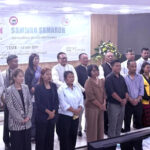Assam Chief Minister Himanta Biswa Sarma has clarified that the state government does not consider the occupation of public land by indigenous people as encroachment. However, he asserted that eviction drives will continue against those suspected to be illegal immigrants, particularly individuals alleged to have entered the state from Bangladesh.
Sarma’s remarks come amidst a large-scale eviction operation in Assam’s Golaghat district, where authorities are working to clear approximately 1,500 hectares of forest land identified as being under unauthorized occupation. The CM emphasized that the government’s target remains “foreigners and doubtful citizens” and not native communities residing on public land.
“Encroachment is defined differently when it comes to indigenous people,” Sarma said. “The real issue is with people who have allegedly come from Bangladesh and are occupying vast tracts of land illegally.”
The ongoing eviction drive is part of a broader campaign initiated by the Assam government to recover government-owned lands, including forest areas and grazing reserves. Sarma noted that more than 42,500 acres have already been cleared over the past four years. Despite these efforts, he claimed that over 9.5 lakh acres remain encroached, primarily by what he termed as “illegal Bangladeshis and doubtful citizens.”
The Chief Minister had previously announced a phased strategy to reclaim government lands, stating that the drives will be executed with firmness but also in accordance with the law.
Political and Social Reactions
While the government’s position draws support from some quarters who view land encroachment as a pressing issue, critics have raised concerns over the lack of legal safeguards and humanitarian implications of such mass evictions. Rights groups and opposition parties have questioned the process through which individuals are identified as “doubtful citizens” or “foreigners.”
Despite the criticisms, the Assam government appears firm in its commitment to continue with the land-clearing efforts.





